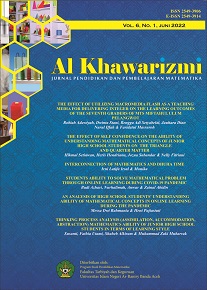The Effect Of Self Confidence On The Ability Of Understanding Mathematical Concepts Of Junior High School Students On The Triangle And Quarter Matter
DOI:
https://doi.org/10.22373/jppm.v6i1.13102Abstract
This research aims to analyze and study in depth about the self-confidence-influenced skills of matematiS from middle school students. The methods in this study use correlational methods with quantitative approaches. The population in this study was junior high school students in west Bandung regency and the sample of 30 people was determined by purposive sampling technique at one of the junior high schools in West Bandung Regency. Instruments in this ability in the form of comprehension ability tests as many as 5 points of questions and self-confidence scale students as many as 24 statement scales. The results of this study concluded that there is a positive influence between self-confidence and the mathematical understanding ability of middle school students. This shows that the higher the student's confidence, the higher the student's mathematical comprehension ability. Factors that affect high self-confidence include: (1) students with a high confidence attitude do not hesitate in making decisions in solving problems (2) students can have many ideas in working on the problem at hand. Meanwhile, students with less confidence will tend to have difficulty in answering potluck questions, students only memorize not yet to understand the understanding of the concept so that the student does not dare to make decisions when solving existing problems.
Kata kunci: self confidence, mathematical understanding.
References
Bibliography
Asih, A., & Imami, A. I. (2021). Analysis of the ability to understand mathematical concepts of junior highschool VIII students on set material. MAJU: Scientific Journal of Mathematics Education, 8(2), 9-16.
Dini, M., Wijaya, T. T., & Sugandi, A. I. (2018). The effect of self confidence on the mathematical understanding ability of junior high school students. JOURNAL OF SYLOGISM: The Study of Mathematics and Its Learning, 3(1), 1-7.
Dahlan, J. A. (2004). Improving Reasoning Ability and Mathematical Understanding of Junior High School Students through an Open-Ended Approach. Dissertation on PPs UPI. Bandung: Unpublished.
Hendriana, H. (2012). Humanist Mathematics Learning with Metaphorical Thinking to Increase Students’ Confidence. Infinity Journal, 1(1), 90–103.
Hendriana, H., Rohaeti, E. E., & Hidayat, W. (2017). Metaphorical Thinking Learning and Junior High School Teachers Mathematical Questioning Ability. Journal on Mathematics Education, 8(1), 55–64
Karim, A., & Nurrahmah, A. (2018). Analysis of students' mathematical understanding abilities in number theory courses. Journal of Analysis, 4(1), 24-32.
Khairani, B. P., Maimunah, M., & Roza, Y. (2021). Analysis of the Ability to Understand Mathematical Concepts of Class XI highschool Students on Sequences and Series Materials. Scholar's Journal: Journal of Mathematics Education, 5(2), 1578-1587.
Kilpatrick, J., Swafford, J., & Findell, B. (2002). Adding it up: Helping children learn mathematics. The National Academies Press. The book is available free on the Web. Accessed, 2(4), 04.Kusdinar, U., Sukestiyarno, S., Isnarto, I., & Istiandaru, A. (2017). Krulik and Rudnik Model Heuristic Strategy in Mathematics Problem Solving. International Journal on Emerging Mathematics Education, 1(2), 205-210.
Martunis, M., Ikhsan, M., & Rizal, S. (2014). Improving the mathematical understanding and communication skills of high school students through generative learning models. Journal of Didactic Mathematics, 1(2).
Melyana, A., & Pujiastuti, H. (2020). The Influence of Self-Confidence on the Mathematical Critical Thinking Ability of Junior High School Students. JPMI (Journal of Innovative Mathematics Learning), 3(3), 239-246.
NURUL, M. (2021). THE EFFECT OF STUDENT FACILITATOR AND EXPLAINING LEARNING MODEL ON THE UNDERSTANDING ABILITY OF MATHEMATICS AND STUDENTS' SELF-CONFIDENCE (Doctoral dissertation, UIN RADEN INTAN LAMPUNG).
Putra, H. D., Setiawan, H., Nurdianti, D., Retta, I., & Desi, A. (2018). Mathematical understanding ability of junior high school students in west Bandung. JPPM (Journal of Mathematics Research and Learning), 11(1).
Purwosusilo, P. (2014). Improving the Ability to Understand and Solve Mathematical Problems of Vocational High School Students Through React Learning Strategies (Experimental Study at SMK Negeri 52 Jakarta). Journal of Education and Teacher Training, 1(2), 209674.Puspaningrum, R. N. I.,
Rohaeti, E. E., & Maya, R. (2020). Analysis of student errors based on Newman's stages of social arithmetic material. Journal of Analysis, 6(1), 47-55.
Purnamaningsih, E. H. (2003). Self-confidence and interpersonal communication anxiety in students. Journal of Psychology, 30(2), 67-71.
Rosmawati, R. R., & Sritresna, T. (2021). Ability to Understand Mathematical Concepts in terms of Students' Self-Confidence in Algebraic Materials by Using Online Learning. Plusminus: Journal of Mathematics Education, 1(2), 275-290.
purwasih, R. (2015). Improving Mathematical Understanding Ability and Self Confidence of MTS Students in Cimahi City Through Guided Inquiry Learning Model. Didactic, 9(1), 16–25.Silviana, D., & Mardiani, D. (2021). Perbandingan Kemampuan Pemahaman Matematis Siswa melalui Mood-Understand-Recall-Digest-Expand-Review dan Discovery Learning. Plusminus: Jurnal Pendidikan Matematika, 1(2), 291-302.
Sumiati, A., & Agustini, Y. (2020). Analisis Kesulitan Menyelesaikan Soal Segi E mpat dan Segitiga Siswa SMP Kelas VIII di Cianjur. 04(01), 321–330.
Sumarmo, U., Hendriana, H., & Rohaeti, E. E. (2017). Hard skills dan soft skills matematik siswa. Bandung: PT. Refika Aditama.
i,S., Marinka, D. O., Febriani, P., & Wirne, I. N. (2018). The effectiveness of ethnomathematics in improving students' mathematical understanding abilities. Raflesia Journal of Mathematics Education, 3(2), 171-176.

